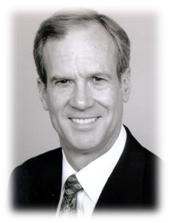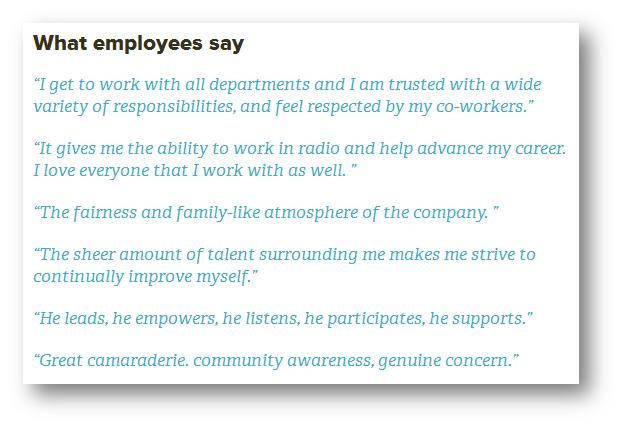In earlier blog posts this year, we talked about how companies like Costco, Trader Joe’s, and Starbucks have set themselves apart by paying their employees more, providing better benefits, and creating a smiley-face workplace atmosphere.
But does this matter? Are happy employees more productive? Do their companies make more money? Or do these policies just drive up costs and make Wall Street crazy?
 Now a recent article in Fast Company shows that there may be empirical proof that companies that focus on happy at-work environments are better investments. Back in 2005, Parnassus Investments created a mutual fund that only sinks money into U.S. companies with happy workplaces – Intel, Google, Costco (of course), Microsoft, and others.
Now a recent article in Fast Company shows that there may be empirical proof that companies that focus on happy at-work environments are better investments. Back in 2005, Parnassus Investments created a mutual fund that only sinks money into U.S. companies with happy workplaces – Intel, Google, Costco (of course), Microsoft, and others.
The proof is in the returns. Since its inception through January of 2013, the Parnassus Workplace Fund produced an annualized return of 9.63%. During the period of Great Recession, the fund generated a 10.81% (the S&P Index produced a 3.97%) return at the same time.
Jerome Dodson (pictured), who founded the fund, notes that “treating people well and authentically respecting them does lead to far better business performance. We proved it works.”
And so where does this apply to radio, an industry that has had to fight and scrape its way to profitability during this same period?
 There’s strong evidence that happy radio stations are more successful. A great case in point is Greater Media Philadelphia. John Fullam’s cluster was recently named as one of the top workplaces in town for the second consecutive year by the Philadelphia Inquirer and Philly.com. These awards are given out based on employee surveys, so you know that other broadcasters around the country might be hard-pressed to get on their local market’s “best workplaces” list based on that criteria.
There’s strong evidence that happy radio stations are more successful. A great case in point is Greater Media Philadelphia. John Fullam’s cluster was recently named as one of the top workplaces in town for the second consecutive year by the Philadelphia Inquirer and Philly.com. These awards are given out based on employee surveys, so you know that other broadcasters around the country might be hard-pressed to get on their local market’s “best workplaces” list based on that criteria.
At a time when more radio people appear to be disgruntled and discouraged, it is heartening to see evidence that a positive workplace environment matters – especially to profitability. But in the case of radio where layoffs, downsizing, budget cutbacks, and additional duties have become commonplace, a company that dedicates itself to winning the “best workplace” hill would seem to have an inside track on higher performance, as well as attracting some of the best employees and managers in the business who might just change stations – and cities and states – in order to work in a better environment.
Below the corporate level, most people in radio didn’t choose this career to get rich. They opted for radio because it was a fun, creative, energetic business in which they felt they could make a difference. Here are a few quotes from Greater Media Philly employees that summarize that emotion:
So a company that sets out to create the best workplace environment in the country? As we used to say during format searches, “It’s a hole you could drive a truck through.”
Who’s going to step up and own this position?
- What To Do If Your Radio Station Goes Through A Midlife Crisis - April 25, 2025
- A 2020 Lesson?It Could All Be Gone In A Flash - April 24, 2025
- How AI Can Give Radio Personalities More…PERSONALITY - April 23, 2025





This kind of thinking is often met with jeers and a chorus of “You can’t go back!” but, in more ways than one, the way it was done in the ‘old days’ offers a lot of insight to the current state of radio (with a few rare and welcome exceptions). Ask anyone who was in radio longer than 25 years ago and you’ll hear that the sentiments of those highlighted from Philly were commonplace in the industry. There is an interesting parallel with then and now – money was never the first reason you got into this business.
Keith, thanks for the perspective. There’s nothing wrong with good old fashioned capitalism but when it overshadows the entertain and information piece of the equation for people, you end up with staffs where too many people are mailing it in or just don’t care past a certain point. I can tell you that at Greater Media Philly, their focus is very three-fold, serve, have fun, but also hit their numbers. It can be done.
I don’t know much about the inner workings of radio but I know a great radio station when I hear it. All of my local stations have reduced staff and use DJ’s that broadcast from halfway around the country to multiple stations at once. Most listeners probably don’t notice but I do and so have a lot of other people that I have talked to. My local country music station that is owned by Clear Channel in Dover, DE does this along with playing the top 40 over and over again and it has ruined the station in my opinion. 6 years ago I started working in 93.3 WMMR’s listening area and I was hooked the first day I tuned in. Actual live DJ’s who know the music and a morning show that can not be beat and you can tell that they all love their jobs and who they work for as they have said it on air over and over again. That’s what made me a fan of Greater Media and even when I am not in the listening area I have them streaming on my phone or Ipod. You can’t beat that winning combo. Gadzooks Philly!
Shawn, thanks for the comments & the keen observations. Done well, there is no substitute for live & local. WMMR does it very well. Appreciate you taking the time and keep listening!
I had the great pleasure of working for John Fullam during our time at AM/FM and even clear Channel. He was (and apparently still is) one of the best. Glad to hear a company like Greater Media lets him continue to do the right thing. Funny, it costs very little to create an environment like this and the rewards are tremendous. The thing is you have to cede a bit of control and allow people the freedom to excel. That scares some companies.
Steve, John has helped create a great culture in Philly. Thanks for the comment and the perspective.
I agree with the more old fashion brand of capitalism, if the company does well, the employee does well. This current Milton Friedman philosophy of screw the worker , it’s all about the stock holders & CEO’s is not healthy for This country, look at CEO pay currently 345 times higher than the worker. This was not the case 25- 30 years ago.
Thanks, Tom, for the heartfelt comments. I have a sense there are more disgruntled staffers in stations than at any other time in memory. Employees in any field need to feel valued and heard. Thanks again.